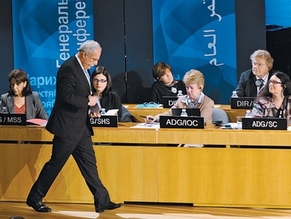|
World Jewish News

PA Foreign Minister Riyad Al-Malkiahead of his speech at the headquarters of UNESCO in Paris earlier this week. Photo by: AFP
|
After UNESCO vote, Israeli sanctions on Palestinian Authority anger U.S.
04.11.2011, International Organizations The United States on Thursday protested to the Prime Minister's Office against sanctions Israel has imposed on the Palestinian Authority, following UNESCO's acceptance of Palestine as a full member.
David Hale, the U.S. special envoy to the Middle East, and ambassador Dan Shapiro told Prime Minister Benjamin Netanyahu's aides that Washington objects to Israel freezing tax income that it collects for the Palestinians.
Netanyahu also announced on Thursday that Israel was freezing funding to UNESCO after it granted the Palestinians membership on Monday. Israel transfers some $2 million to the UN cultural body annually. A source in the Prime Minister's Office said Netanyahu instead ordered the transfer of those funds to initiatives working toward regional cooperation. Netanyahu's decision followed a recommendation by Finance Minister Yuval Steinitz.
"These moves, such as accepting the Palestinians into UNESCO, will not advance peace but will only drive it farther away," Netanyahu said. "The only way to reach peace is through direct negotiations without preconditions."
State Department officials said on Thursday that Hale and Shapiro had conveyed to Netanyahu's envoy Yitzhak Molcho, National Security Adviser Yaakov Amidror and political adviser Ron Dermer their displeasure with Israel's decision to impose sanctions on the PA.
The sanctions included freezing taxes that Israel collected for the Palestinians in October and not transferring them to the PA. The sum, some $100 million a month, is used by the PA to pay wages to security personnel and government officials and civil servants. Holding up the money means thousands of Palestinian civil servants will not be paid before Eid al-Adha or "Festival of Sacrifice."
Hale and Shapiro told Netanyahu's aides the money belongs to the Palestinians and Israel was obliged to transfer it monthly, as stipulated in agreements. They said the United States expects the money to be transferred to the PA as soon as possible, to avoid a crisis there.
Netanyahu's aides said a final decision about transferring the funds has not been made yet and would be discussed soon.
British Foreign Secretary William Hague, who met Barak in London on Thursday, demanded Israel passes the money to the Palestinians shortly. "This decision raises concern," Hague said. "It's not in either party's interest, certainly not Israel's, as it has immediate implications on the PA's ability to enforce order and security in the West Bank."
Haaretz has learned that Netanyahu has not called Chief of Staff Benny Gantz or any other Israel Defense Forces officer to take part in the forum of eight senior ministers due next Tuesday. The IDF will be represented by Defense Minister Ehud Barak, who objects to freezing the tax funds.
No IDF officers were invited to the debate, apparently because the IDF objects to some of the sanctions the ministers have decided on. The IDF, especially the Central Command, objects to penalizing the PA in a way that could affect the authority's security coordination with the IDF.
The IDF believes Israel should make good will gestures toward the Fatah-dominated PA following the deal to release captured soldier Gilad Shalit, which has strengthened Hamas.
Senior IDF officers said on Thursday that suspending the funds transfer is an irresponsible move that could seriously undermine security coordination with the Palestinians and even lead to a violent conflagration in the West Bank.
"They made a decision without asking the army," a senior officer said. "Afterward we'll have to clean up the mess. What will the Palestinian commanders do when their soldiers don't get paid? Continue chasing terrorists?"
Haaretz.com
|
|
